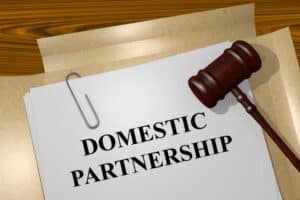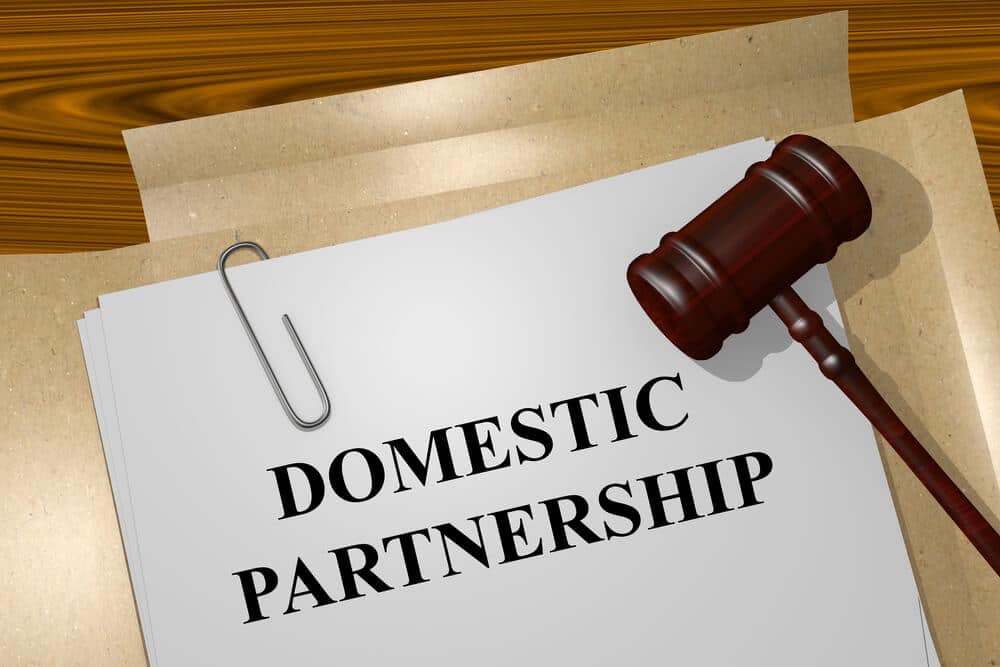All About Domestic Partnerships in New Jersey
Domestic Partnerships Allow Cohabiting Couples to Have Many of the Same Legal Entitlements That Married Couples Have in NJ
 A domestic partnership is a legal term used to describe people of the same sex or opposite sex that are ages 62 or older and have at least one person registered with the state as a retiree. Those in the relationship must also share a common residence, and it must be shown that they are both responsible for the other’s well-being. This is typically shown through certain evidence. A domestic partnership is another word for a relationship status with certain benefits that those in a same-sex relationship could not otherwise benefit from.
A domestic partnership is a legal term used to describe people of the same sex or opposite sex that are ages 62 or older and have at least one person registered with the state as a retiree. Those in the relationship must also share a common residence, and it must be shown that they are both responsible for the other’s well-being. This is typically shown through certain evidence. A domestic partnership is another word for a relationship status with certain benefits that those in a same-sex relationship could not otherwise benefit from.
With the advent of legal, same sex marriage, there has been less and less need for the domestic partnership, but they still exist. Notably, those in existence prior to the legalization of same sex marriages under a different set of requirements are still seen as legal and valid.
Purpose of a Domestic Partnership in New Jersey
Domestic partnerships were created in an attempt to provide the same legal protections to same sex couples as are afforded to opposite sex couples who are married. A domestic partnership is legally equal to a marriage, and can be created and terminated in similar ways. Those involved also have very similar legal protections. Domestic partnership is a way for same sex couples to obtain similar rights of a marriage without requiring them to get married.
Domestic Partnership: Pros and Cons
Domestic partnership status provides those in the partnership with certain statutory protections relating to housing, discrimination, and employment. The domestic partnership also affords a partner to make medical and legal decisions for their incapacitated partner. Furthermore, partners may receive tax exemptions from personal income taxes as well as the transfer inheritance tax.
Obligations Domestic Partners Must Face
The obligations of each person involved in a domestic partnership are governed by New Jersey Rev. Statute 26:8A-6. Specifically, when a domestic partnership is created, each partner has certain obligations to the other partner. One, a partner is not liable for the debts of another partner that have been developed prior to the creation of the domestic partnership.
Profile to Enter a Domestic Partnership
Domestic partnership has strict legal requirements to satisfy in order for two people to establish and register a domestic partnership with the state. Number one is that each partner must be age 62 years or older. The second requirement is that both of these individuals must agree to be responsible for the other’s well-being. For example, they must agree to carry-on with the relationship as if they were actually married, bearing the living expenses for each other, caring for them when they are in need, etc. Each partner must have not terminated a domestic partnership within the last 180 days or already be in a domestic partnership. The domestic partners must live in the same residence within the state they are applying for domestic partnership, and they must not be related by blood. Many of these requirements also apply to marriage.
Procedures for Ending a Domestic Partnership in NJ
Divorce of a marriage and termination of a domestic partnership are extremely similar in that they require the same things. A domestic partnership is a legal relationship that requires a legal creation within the courts. Therefore, in order to end a domestic partnership, it requires a legal termination within the courts. A Partner must file for the termination of a domestic partnership within a New Jersey court.
 Grounds for ending a domestic partnership include adultery, desertion, cruelty, separation, addiction issues, mental illness, institutionalization, and imprisonment. Many of these same grounds apply to divorces of marriages. After a partner files for the termination of a domestic partnership, certain issues must be solved in court. These issues include the division of property, alimony or partner support, and possibly child custody. These issues are also very commonly attributed to a marital divorce or dissolution.
Grounds for ending a domestic partnership include adultery, desertion, cruelty, separation, addiction issues, mental illness, institutionalization, and imprisonment. Many of these same grounds apply to divorces of marriages. After a partner files for the termination of a domestic partnership, certain issues must be solved in court. These issues include the division of property, alimony or partner support, and possibly child custody. These issues are also very commonly attributed to a marital divorce or dissolution.
Estate Planning and Domestic Partnerships
Though domestic partnerships provide certain tax benefits for domestic partners, such as exemptions when filing personal income taxes and when filing a transfer inheritance tax, they do not enjoy the same benefit when it comes to estate planning. Estate tax breaks and exemptions are not provided to domestic partners.
Important Case Law in Lewis v. Harris
In Lewis v. Harris, the court carefully considered whether or not the Constitution of the State of New Jersey compels the state to allow same-sex couples the right to marry. Seven same-sex couples sued state officials when their applications for a marriage license were denied. They proposed that their constitutional rights were violated. After the case made its way to the New Jersey Supreme Court, seven justices ruled that the equal protection rights of the plaintiffs were, in fact, violated, and that the current law in New Jersey was unconstitutional. As a result, this provoked a legislative response by then Governor Corzine, which legalized civil unions in the State.
Contact a Capable Family Lawyer to Discuss Your Domestic Partnership in Ocean and Monmouth County Towns
Navigating the muddied waters of domestic partnership law can be confusing, especially if you are not up to date on the law and do not have a legal background. Availing yourself of an experienced family lawyer with a background practicing in domestic partnership law is the best thing you can do to ensure that your rights are fully recognized and protected. Contact Bronzino Law Firm if you have questions about a domestic partnership related legal matter anywhere in Tinton Falls, Manalapan, Asbury Park, Wall, Ocean Township, Bay Head, and elsewhere in Ocean and Monmouth County. We assist clients with all of the legal aspects of domestic partnerships, and our skilled family law attorneys are pleased to provide you with a free consultation. Contact us at (732) 812-3102 for your free, confidential consultation, or you can also contact us online.







